This post has already been read 3128 times!
Do you really know what makes you happy?
We all want to be happy. In fact, even if we don’t admit it, most of the time we are happy until we find ourselves craving for something that others have or get the feeling that we are missing out on something.
That takes us to the state of un-happiness until we are able to get back in balance.
Is Happiness an elusive concept that you are chasing?
Last week I received a call from a lady who found me via Google, reached my website and decided that she wanted to take me up on a consultation.
It appeared that she wanted to become a coach and also wanted coaching.
Our conversation soon indicated that she really did not know what she wanted as she dropped the desire to become a coach and decided to be coached all within a matter of two minutes.
We then spent the next half an hour doing a consultation to understand what her goals were and if we could work together to achieve her desired transformations. The lady had gone through a tough time and was seeking direction. So I suggested we take up a key issue.
A recurring theme during the consultation was her lack of happiness even though as a detached observer, I could fathom that she had ridden out the storm in her life and landed on her feet and had much to be proud of.
She had made the best of her situation and yes, at the end of the consultation she discovered a direction worth exploring on her own that would fit in with her lifestyle although as she herself realized, she was not coachable at present and needed to first identify what was making her unhappy.
In other words, she had to first master the first pillar of Emotional Intelligence – Self-Awareness.
Sadly, Happiness is not a coachable goal although one can offer guidance to the seeker and suggest some techniques to enable the seeker to find their equilibrium state of happiness.
This post is dedicated to self-help for happiness.
The Art of Happiness
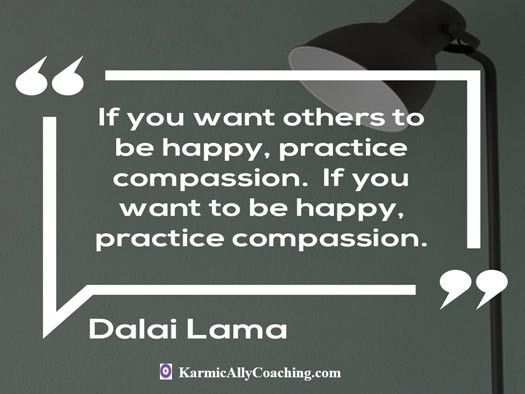
The art of happiness has been discussed in discourses by the Dalai Lama. It is also found in the Bhagavad Gita. Both references echo the ultimate truth that happiness lies within us and is a state of mind.
From my own life experience, I know that being happy attracts more happiness.
Especially when I am able to bring a smile to another’s face from my behavior which is cheerful because I am happy from within and practice compassion for other beings by treating them with respect and understanding.
The other person in turn reaches out to assist me in whatever way I require at that moment and happiness multiplies all around.
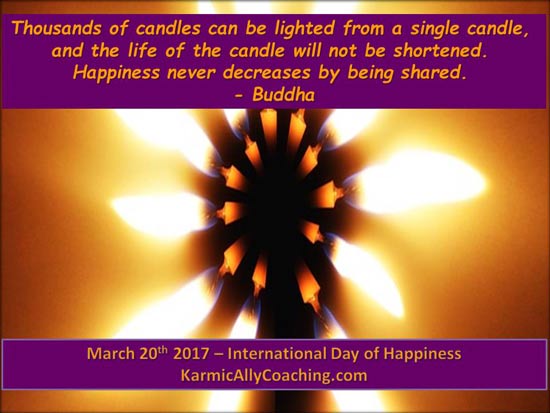
Happiness and unhappiness are relative experiences or dualities.
To achieve true happiness, it is important to rise above the dualities and accept that as we grow, the concept of happiness too changes as with the changing purpose within the soul. Hence it is essential to be sensitive to one’s spiritual nature.
Bhagavad Gita stance on Happiness
“He who is unattached to the external world and its objects, and is attached to the Inner Self, will attain supreme happiness, which is everlasting.”
In other words, real happiness or ‘anand’ as it is called in Sanskrit is the goal for all sentient beings and until then, all that we are passing through is different states of mind.
All sentient beings crave real happiness and strive to achieve it, some ignorantly and some with the help of knowledge.
Meditation helps open the intuitive channels to gain knowledge of one’s True Self and to determine where our actual happiness is to be found.
In touch with our soul, we know what gives us permanent happiness and what changes are required within us to achieve happiness.
At the same time, to achieve this state of mind, it is important to have an attitude of gratitude for the level of happiness that already exists within our lives to God. It is equally important to acknowledge the acts of kindness that others do for us.
By doing both, we start living in an environment which is positive and vibrates with happiness. This attracts further happiness of the type required at that particular moment of time for us.
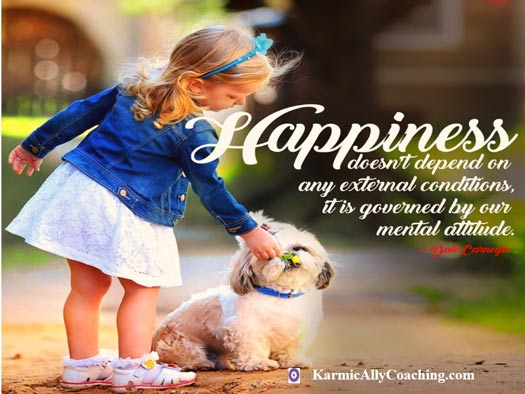
Programming the mind to accept that the God within us is the source of happiness for us not only raises our positive vibrations but also helps us to achieve all that we want because we begin to believe that happiness can be ours.
This in turn makes it a reality in our mind with the subsequent materialization of our want.
Often, where such materialization of perception of what would make us happy does not happen, we start to despair and lose faith.
That is the time to analyze the circumstances and engage in self-introspection. Sooner or later, you’ll discover it wouldn’t have been in your best interest and something better and more suited to your wants manifests.
Another post you might like to read is Make Happiness a Habit with more tips that you can easily implement and get results.
What is your view about being in the state of happiness? Have you ever felt out of sync and had to work on your mind to be happy or reach out for help?
I’d love to know more about your self-help tips for being happy.
Additional Resources for Happiness and Emotional Intelligence
I have 2 resources to supplement this happiness post. I invite you to check out one or both.
Karmic Ally Coaching Self-Awareness Bundle
Download the Self-Awareness resource here.
Stress management with Chakra Balancing exercises & 1 Minute Stress Management Tips
Click the image to learn more.
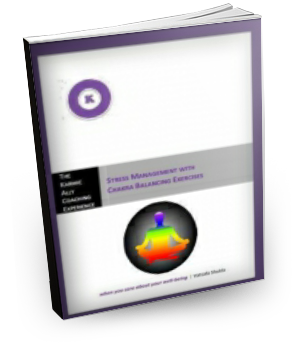
Updated December 2022


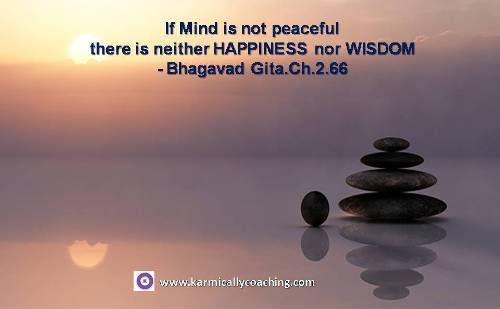

 I adhere to the Certified Coaches Alliance Code of Ethics and Standards. A copy is available on request.
I adhere to the Certified Coaches Alliance Code of Ethics and Standards. A copy is available on request.
 Let's Talk through the Connect Form:
Let's Talk through the Connect Form:
I completely agree that happiness should come from within and you get it when you actually realize it’s true.
However, it took me a while to accept it, but I came to realization that it’s also OK to be sad sometimes. Otherwise we’re creating too much of a pressure to always be upbeat and happy, which can become stressful. Quite the opposite of what happiness should be about 🙂
Absolutely, Delia. As long as happiness is a genuine heartfelt emotion and not one that is forced upon us, we can maintain the state of grace. Quite often, people who are feeling sad deny that feeling and put up a front of being happy which can lead to far reaching consequences for themselves and their loved ones. If a feeling of sadness comes up, that is normal and human but if the sadness lingers long, it is time to take a family member of the family doctor into confidence if self-introspection and analysis does not help us to identify what has to change to return to a state of internal contentment.
I would have to agree that happiness comes from within and is a state of mind and a habit that we cultivate daily. It is much like Zen. Thanks for a great article.
Thank you Shawn for bringing attention to Zen. You are right, using the 5 habits that I mentioned in my other post help us to strengthen the happiness muscle and while nobody can be happy in sorrow, it helps to build our resilience and cope with life and find ways to solve our most pressing problems from a state of grace.
This is such an interesting topic for me, Vatsala. I observe the world around me and see how some people appear to be happy…just because. Happiness, or at least my idea of what that looks and feels like, has always been elusive to me. I find learning brings me happiness. I often view myself as someone who is always striving for more. Being a very astral, nerve-sense individual I am over-stimualated by the world around me and often fly ahead into the future of what could be, rather than staying in the moment of what is. I have moments of happiness, yet I wouldn’t say that most of the time I feel happiness. Having read that “joy is an attitude of the heart” and that happiness generally comes from external impetus, while joy is internal, does make a lot of sense to me. I think happiness often comes from something “out there”, while joy is something that comes from “in here”. Wonderful post, Vatsala and I wonder how many people neglect knowing themselves and continue looking for the happiness they so seek, far outside themselves.
In Yoga, one of the ways to attain self-realization is through the path of learning and it seems that is the right yoga for you, Beverley. At the beginning of our spiritual journey, we more often than not seek solace and satisfaction in external sources for our happiness until we realize that happiness is within us, or as you put it so well, joy. I tend to think of it as being in a state of grace and use my 5 habits which include gratitude to strengthen my happiness muscle.